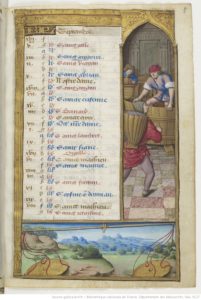
“September”, kalendar page from Les Petites Heures d’Anne de Bretagne (The Little Hours of Queen Anne of Bretagne), by the Maître des Triomphes de Pétrarque. From Bibliothèque nationale de France, Paris (France).
Andrewes’s most notable contribution to Christianity, and surely the reason for his appearance on the Kalendar, was as head of the “First Westminster Company”, which was responsible for translating the first books of the Old Testament (Genesis through 2 Kings). In addition, he acted as general editor for the translation project—which ultimately resulted in the King James Version of the Bible. In the United Kingdom, this translation is known as the Authorised Version, because it was the only version authorized to be used in public services of the Anglican Church. (In one of those weird quirks of law, in the UK, the AV is under Crown copyright in perpetuity, and as such can only be published under license from the Crown. Everywhere else in the world, where the translation is known as the KJV, it is in the public domain.)
T.S. Eliot was an admirer of Andrewes, and he even went so far as to lift a passage from one of Andrewes’s sermons and use it in one of his most well-known poems, “The Journey of the Magi”. Eliot does put the line in quotes, even though he compresses it, but he doesn’t give any attribution in a footnote (something he regularly did in other poems). The line is from Andrewes’s “Nativity Sermon”, which he preached, as Bishop of Winchester, to James I on Christmas Day, 1622: “A cold coming they had of it at this time of the year, just the worst time of the year to take a journey, and specially a long journey. The ways deep, the weather sharp, the days short, the sun farthest off, in solsitio brumali, the very dead of winter.” As the opening of Eliot’s poem, it becomes, “’A cold coming we had of it, / Just the worst time of the year / For a journey, and such a long journey: The ways deep and the weather sharp, /The very dead of winter.’”


